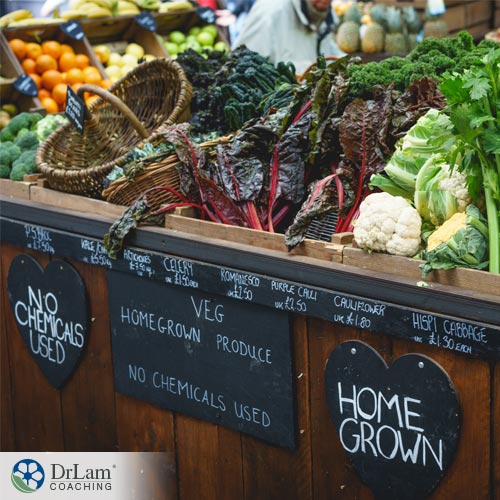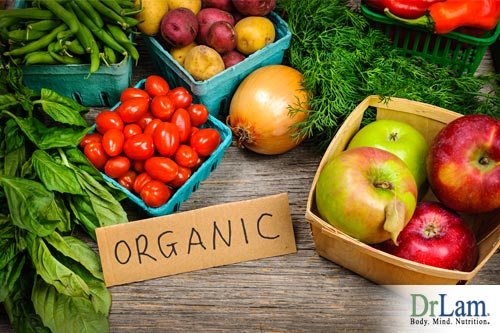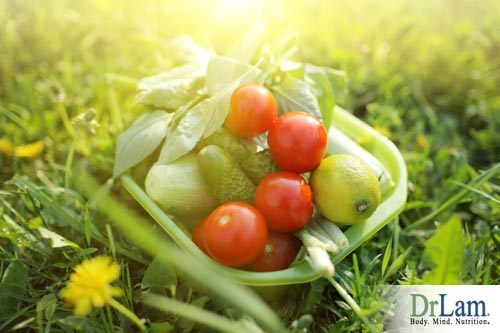 Are the benefits of an organic diet hype or reality? Only for the rich or simply a waste of money? The debate surrounding organic food has been ongoing for as long as people have been eating it. Some believe an organic diet is healthier, whereas others argue against it. So, is there any point in spending that extra money on organic products in the grocery store? Well, the science behind organic food may surprise you.
Are the benefits of an organic diet hype or reality? Only for the rich or simply a waste of money? The debate surrounding organic food has been ongoing for as long as people have been eating it. Some believe an organic diet is healthier, whereas others argue against it. So, is there any point in spending that extra money on organic products in the grocery store? Well, the science behind organic food may surprise you.
The term organic food can be a little confusing. In the U.S., most foods are regulated by the Food and Drug Administration (FDA), but they do not restrict how and where the term organic is used. Instead, this task is assigned to the National Organic Program (NOP) and overseen by the U.S. Department of Agriculture (USDA). Food must meet three specific requirements to officially receive the label of organic.
Remember: Only foods that receive the organic seal from the USDA are truly recognized as organic food.
This is an important distinction because anyone can say their products are organic—including those sold at Farmers’ Markets and in small stores—however, unless the seal is there, as a consumer you won’t be unable to verify these claims. The former first lady, Michelle Obama, ran into this problem when sewage sludge was discovered in the dirt of the White House garden. Thankfully, the soil was examined and determined to be safe for growing food. But although the garden continues to follow organic principles, it cannot be certified organic.
 When scientists from Britain looked at organic versus non-organic food, they were surprised to find actual differences between the makeup of these foods. One study tested 11 brands of canned organic soup and compared them with 24 non-organic brands and found nine times more salicylic acid in the organic soup. Surprisingly, four non-organic brands had no salicylic acid at all.
When scientists from Britain looked at organic versus non-organic food, they were surprised to find actual differences between the makeup of these foods. One study tested 11 brands of canned organic soup and compared them with 24 non-organic brands and found nine times more salicylic acid in the organic soup. Surprisingly, four non-organic brands had no salicylic acid at all.
Salicylic acid is best known as the anti-inflammatory compound found in aspirin. But why do vegetables contain salicylic acid? The answer lies in how crops naturally deal with insects and pathogens. Plants produce salicylic acid to deter these pests. However, over the last century, an increase in pesticide use may have caused plants to stop producing this acid since there was no longer a need to do so.
The anti-inflammatory power of dietary salicylic acid is helpful in reducing inflammation in your body. This means that instead of taking a pill, you can reduce inflammation by simply eating the right fruits and vegetables.
Inflammation is your body’s first line of defense against cuts, scrapes, bumps, bruises, and stress. Yes, stress is on the list! Your body does not differentiate between different types of threats. Both physical stress and emotional stress damage your body in many of the same ways, by increasing inflammation throughout your body and slowing down your immune system. Stress also causes your body to retain fat cells, which makes it extremely difficult (almost impossible) to lose weight. Some scientists believe that uncontrolled inflammation may also be a precursor for certain illnesses and even cancer.
The NeuroEndoMetabolic (NEM) stress response system watches over your body and helps deal with problems as they arise—small or large, it deals with them all. The NEM system is made up of six interconnected circuits that send signals to other parts of your body triggering the production of certain hormones that keep your body functioning properly.
 When your body becomes overly stressed, you may begin to suffer from worsening symptoms. Increasing inflammation can fatigue your body, moreover, hormones typically produced to return your body to a state of homeostasis can begin to run out. When this occurs, symptoms of Adrenal Fatigue Syndrome (AFS) start to appear. Initially, the symptoms of AFS are mild and the signs are easily missed. This could simply be tiredness, drinking more caffeine in the afternoon, an increased prevalence of colds and flu, or a new food allergy. If not kept under control, these early warning symptoms can progress into much more noticeable symptoms such as depression, panic attacks, anxiety, changes in your menstrual cycles, infertility, diarrhea, constipation, and debilitating exhaustion.
When your body becomes overly stressed, you may begin to suffer from worsening symptoms. Increasing inflammation can fatigue your body, moreover, hormones typically produced to return your body to a state of homeostasis can begin to run out. When this occurs, symptoms of Adrenal Fatigue Syndrome (AFS) start to appear. Initially, the symptoms of AFS are mild and the signs are easily missed. This could simply be tiredness, drinking more caffeine in the afternoon, an increased prevalence of colds and flu, or a new food allergy. If not kept under control, these early warning symptoms can progress into much more noticeable symptoms such as depression, panic attacks, anxiety, changes in your menstrual cycles, infertility, diarrhea, constipation, and debilitating exhaustion.
The adrenal glands, just like your hungry stomach, must be adequately nourished. A healthy diet is not just another thing your healthcare advisor wants you to do, it’s something your body needs. Adding organic food to your diet can help you naturally obtain the nutrients and anti-inflammatory ingredients your body may be lacking. If you can slow down or reverse inflammation through a healing diet, your body can rest and restore itself before the next one of life’s stressful events inevitably happens.
But salicylic acid isn’t the only component of organic food that will help you. Organically grown and produced foods are often easier to digest, which is what makes them so useful. No, organic carrots are not digested any differently than regular carrots. However, pesticides and heavy metals have to be dealt with in addition to digesting the food itself. This can place extra pressure on your NEM system, which has to quickly deal with these foreign substances before they cause harm to your body. If you’re suffering from AFS, your body is already tired and exhausted. Therefore, the extra work caused by eating non-organic food can make you even more tired, and your body may not be able to absorb the nutrients it so desperately needs.
After reading this article, you may have come to the conclusion that purchasing organic food is important. But there are a few helpful hints you should take on board before rushing out to fill your shopping cart with organic produce.
Organic food is expensive. If you’re on a tight budget, the shock could hit you hard. Sometimes, it can be necessary to pay 3–4 times more for the same product compared to traditionally grown foods. This is especially true if you live in the middle or upper parts of the U.S. during the winter months since organic produce will have to be grown in warmer climates and shipped. Add to this the increased costs associated with growing the food on certified organic land and the increased risk of disease and pests—and this all adds up to more money out of your pocket.
If you want to save money on organic food, it can be helpful to know which organic products you should be purchasing, and which traditionally grown products are considered safe, i.e., low in pesticides and other substances.
To avoid pesticides, only purchase strawberries, spinach, apples, pears, grapes, celery, tomatoes, bell peppers, and potatoes that are organic.
The following clean foods are low in pesticides: avocado, pineapple, onions, asparagus, honeydew, broccoli, cauliflower, and mango. Sweet corn is typically low in pesticides, but make sure it is non-GMO.
 If you live in a health-conscious community, you probably already know some of the best places to find organic food. For those who are unsure, check out large grocery store chains near you, which often have a small refrigerated section of organic produce. Stores such as Aldi, Whole Foods, Publix, Trader Joes, and Harris Teeter usually have an organic section.
If you live in a health-conscious community, you probably already know some of the best places to find organic food. For those who are unsure, check out large grocery store chains near you, which often have a small refrigerated section of organic produce. Stores such as Aldi, Whole Foods, Publix, Trader Joes, and Harris Teeter usually have an organic section.
If you don’t have access to any of these stores, you could try to look up organic stores onlineCheck out this excellent resources for finding organic food stores in your area..
Farmers’ Markets are great places to find organic food, especially when fruits and vegetables are in season in your hometown. These are also excellent spots to look for organic meat and other food at discounted rates. Purchasing locally grown produce directly from farmers cuts out the middleman and can also cut the costs of meals.
Yes! As much as you can within your household budget and the availability in your area, it’s always best to buy organic fruits and vegetables for you and your family to eat. If fresh is not available, consider purchasing frozen organic vegetables an alternative during winter months.
Organic food is more than just hype. Eating organic food can help decrease inflammation in your body, which can be particularly helpful to your AFS recovery. The USDA regulates how organic foods are grown and tightly monitors who receive the organic seal, so make sure any products you’re buying have been certified. Although organic food can be expensive and sometimes difficult to find, certain fruits and vegetables should always be purchased organic to provide the healthiest option for you and your family.
© Copyright 2012-2019 Michael Lam, M.D. All Rights Reserved.
Yes! As much as you can within your household budget and the availability within your area. It’s always best to buy organic fruits and vegetables for you and your family to eat. If fresh is not available, consider purchasing frozen organic vegetables an alternative during the winter months.
